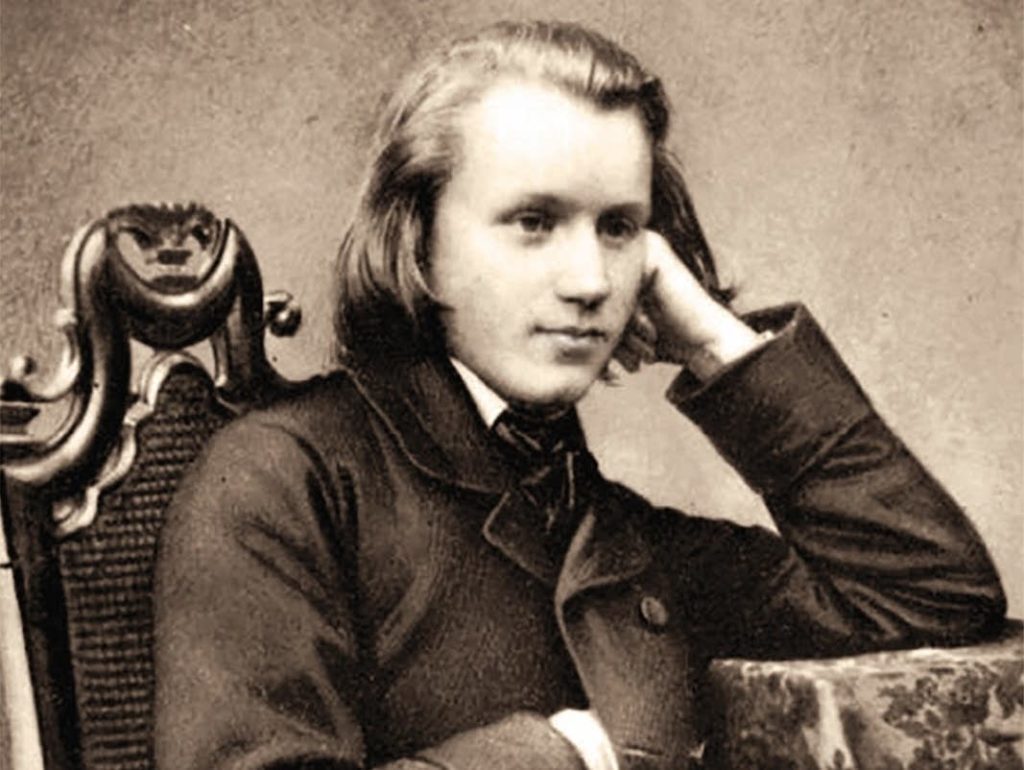Johannes Brahms (1833-1897) was born and raised in the cold, dank, north German city of Hamburg. (As an adult, he habitually vacationed in the warmer climes of Italy; it would seem that it took him half a lifetime to warm his frozen bones!)

Physically, Brahms matured very slowly. By the age of 20 – fully grown – he was short, blonde, blue-eyed dude, almost girlish in his physical beauty, with a high, piping voice. This description might work for a 12-year-old guy, but not one that’s 20. In fact, the year Brahms turned 20, his friend Hedwig Salomon wrote in her diary:
“Brahms has a thin, boyish little voice that has not yet changed, and a child’s countenance that any girl might kiss without blushing.”
Brahms’ frequent (and eventually exclusive) indulgence in prostitutes dates from this time of his life, his early 20’s. Writing in 1933, Brahms’ biographer Robert Schauffler (The Unknown Brahms, Crown Pub.) delicately observed:
“Thus handicapped, he naturally found trouble in getting respectable girls to take his young virility seriously; whereas the daughters of joy, besides possessing a deep knowledge of masculine psychology and being blasé to sex appeal, would take any man as seriously as they could take his pocketbook.”
Of course, the real reason behind Brahms’ predilection for prostitutes has to with his catastrophic experiences as a brothel pianist between the ages of 12 and 14 (discussed in yesterday’s Music History Monday post) and his subsequent, life-long aversion towards intimacy with women.
Brahms’ late physical development drove him crazy. His voice did not change until he was 24, by which time he had already done permanent damage to it by forcing himself to speak in a low, gravelly manner, presumably to sound more “manly.” Brahms’ beard didn’t even start to grow in until his mid-thirties. Dr. Alfred Gruneberger, Brahms’ physician later in life, claimed:
“that the exaggeratedly hirsute and virile appearance of his long-bearded middle age was encouraged by Brahms as a psychic compensation for the humiliation he had suffered on account of the smooth cheeks of his early twenties.”

Brahms moved permanently to Vienna in November of 1862 at the age of 29 (coincidentally, almost 70 years to the day after Beethoven arrived in the city from his hometown of Bonn). Youthful looking though he was, by the age of 29 Brahms’s compositional maturity was fully in place. He had turned away from the literary “Romanticism” of Robert Schumann and had turned his back entirely on the over-the-top, expression-at-all-costs Romanticism of the New German School of Liszt and Wagner. He preferred to craft his music objectively, by combining the contrapuntal clarity of Bach with the formal structures of Classicism, and informed by his admittedly modern melodic and harmonic language.
Soon enough, personal circumstances would provide Brahms’s expressive wherewithal to compose that single work that would establish him as a major composer.…
Continue reading, only on Patreon!
Become a Patron!